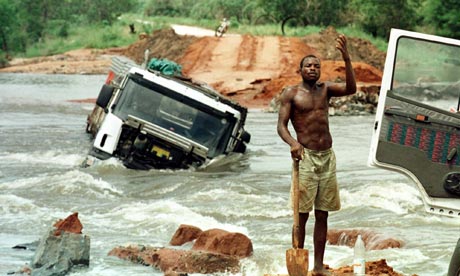Adapting economies and maintaining infrastructure under global warming will cost developing countries dear, and resentment is building as rich countries delay in providing finance

Africa, notoriously, has the worst roads in the world because its extremes of sun and rain bake them dry or leave them cratered and impassable for months at a time. The whole continent, which is physically larger than China, western Europe, India and the US together, still only has 171,000 km of all-weather roads - less than a country like Poland.
Now it can expect an extra $183bn bill just to maintain its few paved roads over the next 60 years because of the impact of climate change. According to a UN university team of economists, every African country will have to pay an extra $22m-$54m a year just to keep its already substandard road infrastructure in today's condition. The bill to upgrade and maintain Africa's many millions of miles of secondary roads and tracks, which can be expected to deteriorate even further with climate change, is not even considered.
The figures are not exact, but show how even the minimum of infrastructural improvement – considered a prerequisite for economic development – will be reined in in poor countries unless money is made available for them to adapt to climate change, and unless rich countries lessen the chances of runaway warming by reducing emissions quickly.
The road study coincides with a series of more sobering short reportsjust released from 19 developing countries that were asked by the UN Development Programme (UNDP) to calculate the costs of adapting just one or two sectors of their economies to climate change over the next 20 years.
The results are shocking. Costa Rica, for instance, estimates that it will need more than $3bn just to adapt its water and biodiversity sectors; Namibia $4bn to reduce the emissions from its power stations and to adapt its farming; Turkmenistan up to $7bn for its electricity and water sector; Togo $688m by 2030 to reduce emissions in its energy sector and to adapt its farming; Niger, nearly $2.5bn to find alternatives to burning firewood and adapt its farming.
The total, just for a few sectors of some countries, can be expected to be well over $100bn, roughly in line with the Lord Stern's estimates of at least 5% and perhaps more than 20% of global GDP being needed for adaptation.
"The figures are not a wish list of funds from rich countries, but an appraisal of the costs of reducing emissions in just a few areas of a few countries," said a UNDP spokeswoman.
But they also highlight the fact that the rich countries, currently at the climate change talks in Bonn, are nowhere near providing the $30bn that was pledged in the Copenhagen summit in 2009 for "fast-start" finance.
Analysis by the World Resources Institute last month showed that the world's 21 developed countries and the European commission have publicly announced pledges of $28bn in "fast-track" money, but next to nothing has been delivered. In addition, much of the money pledged appears to be double counted with existing official development assistance (ODA) budgets.
Resentment at the rich countries' delays in paying for adaptation is now reaching a crescendo. On Tuesday in Bonn, environment and development groups joined unions, health and youth justice organisations to demand that rich countries raise some of the long-term billions needed via a 0.02%-0.05% international financial transaction tax (FTT).
No comments:
Post a Comment